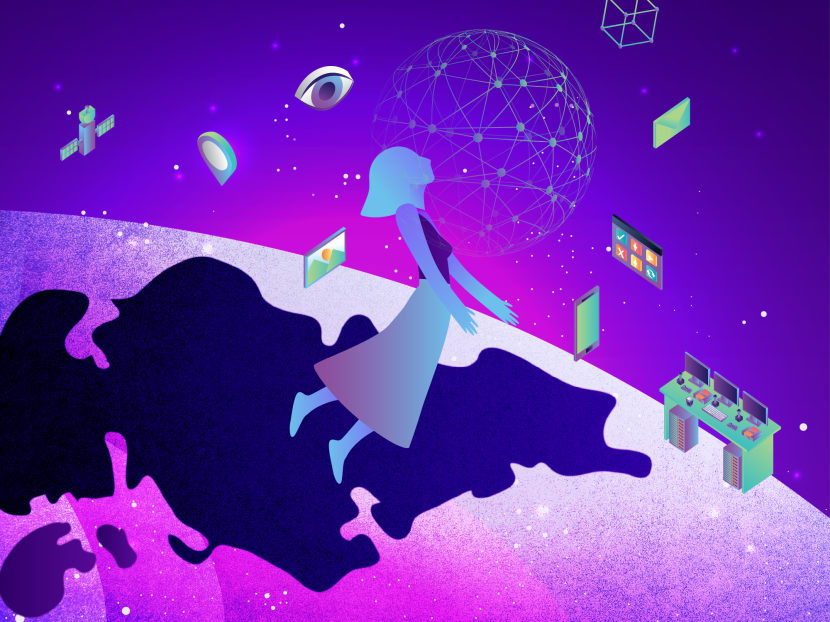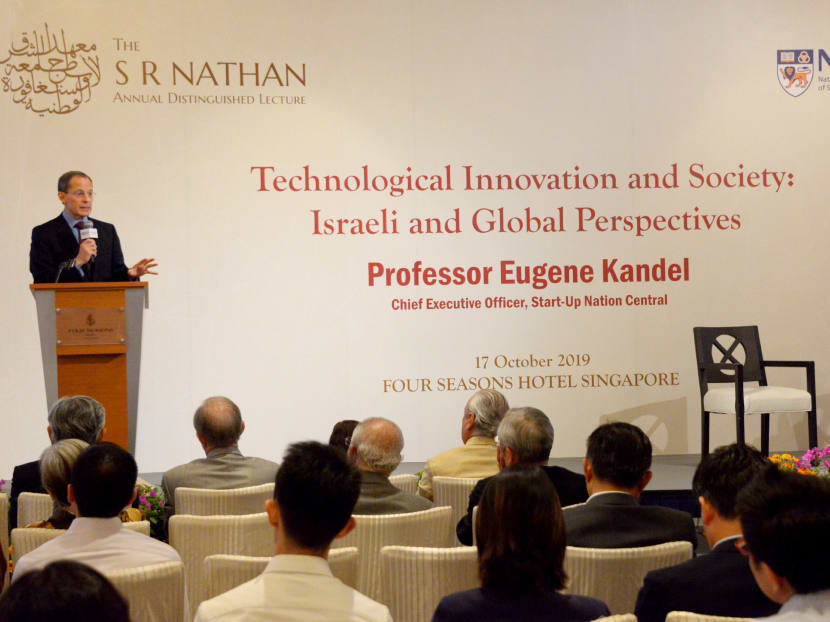Technology is disrupting societies in unprecedented ways. What can small states do?
Today’s rapid technological changes are unlike what the world has seen before and these can have profound implications for societies, said Professor Eugene Kandel, who is widely credited with being the pioneer of Israel’s start-up economy.

Growing inequality is a feature of technological innovations, says Professor Kandel. And countries that have a tech-driven economy face the dilemma of whether to tax the companies and their workers more and risk them pulling out.
Today’s rapid technological changes are unlike what the world has seen before and these can have profound implications for societies, said Professor Eugene Kandel, who is widely credited with being the pioneer of Israel’s start-up economy.
For instance, countries such as Israel which have parallel tech-driven and traditional economies will find it hard to manage both at the same time, said Prof Kandel at the S R Nathan Distinguished Lecture organised by the National University of Singapore’s Middle East Institute. Below is an edited excerpt of his lecture on Oct 17, where he also touched on how Singapore can ride the wave of change.
We live in a very uncertain world today. A lot of that uncertainty comes from technological change.
Each technology solves some problems, but it also creates other disruptions that may generate problems on the social, political and business fronts. The disruptions are to firms, people, governments and security. The more we become technologically dependent, the more we become vulnerable. We have to defend ourselves more, whether from privacy as individuals or from terrorist attacks as governments.
For example, 3D printing allows a handicapped person to design his own tool and produce it very, very inexpensively next to his home. But at the same time, you are going to drive a lot of people out of business, and leave many unemployed.
It is the same with autonomous vehicles, or with blockchain technology. All of these technologies are going to introduce a lot of disruptions.
Why is this technological revolution different from any other technological revolution? We have had many of those: Electricity, steam power — even the plough was once a big technological revolution.
I can think of three main reasons why it is different this time. In the past, technology was substituting for muscle. Now, technology is substituting for our senses. We are getting machines that we can hear, sense or even smell with. Think about autonomous driving, it replaces your eyes and ears, and translates those senses into mechanical actions.
The difference is when you replace a person or muscle with a machine, you are replacing 10 people with one machine. In order to replace another 10 people, you need another machine.
For the first time, we have enormous economies of scale. That means for the first time, you are going to end up potentially in a situation where you might not really need so many people to produce enough stuff for all of us to consume. That is something that we have never had. No economic models that I know of have these features.
The second difference is that over the last 200 years, technological change was contributing to a major shift from agricultural societies to manufacturing societies to services societies. From over 90 per cent of people working in agriculture, today, in developed countries, you have less than 2 per cent of people in agriculture, and about 80 per cent in services.
The current set of technologies is eating into the services sector, and these people are not going to return to agriculture and manufacturing. They are going to stay in services, or become redundant.
The last difference is that the technological changes over the last 200 years were slow. Those took decades, if not centuries. Today, they take years.
Just look at your smartphone. In 2007, when they appeared, nobody understood what they were going to do. But today, it has completely changed our lives.
This is just one small example. The speed of change and the unpredictability of change creates a lot of uncertainty.

This brings me to social outcomes. Here, I would like to talk about what we know about Israel.
Israel has two economies, and they are almost completely disconnected. There is one economy that is on the bottom. It is the more traditional economy, and it is heavily regulated, much less productive, much more reliant on the government, and much more watched over by the government, and is domestically-oriented.
Then there is the “zeppelin”, or “upper” economy, which is the innovation economy, one which is almost entirely focused outwards. Because Israel is a small country, all of our markets are outside; this is an attitude that should be familiar to Singaporeans.
Most of its capital — that is the difference between Singapore and Israel — also comes from outside. All of its competitors are outside of the country. Although some are Israeli, they all feel as if they are international competitors.
The attitudes of the people in this economy are very cosmopolitan, and they are very, very productive. The scary thing is they are also highly moveable. Any country would love to get workers from another country's “zeppelin economy” — everyone wants them.
The challenge that this generates is that it almost inherently creates stratification of society. These people in the “zeppelin” economy are powered by technology. The people in the other economy are the ones disrupted by it.
The people in the upper economy who are creating solutions for some of the people in the bottom economy are actually disrupting it. You cannot be too popular when you create mass unemployment with one piece of software, so there is inherent tension between these two economies.
The people in these two economies are also very, very different. They are very differently trained, financed very differently, they even have different regulations, because each country tries to attract these people and so they try to create conditions that are more conducive for people in upper companies to come to them. That creates a challenge.
If you are a country, you have to figure out three questions: How do you create an environment in which your traditional economy can grow?
What are the environments in which your “zeppelin” economy can grow? And how do you reconcile these two economies to live together in one society? These are very, very tough questions that do not yet have answers.
Growing inequality is a feature of these technological innovations. It is not a bug. It is unpleasant, but it is a feature. It has always been there, and always will be.
The only difference now is that because of these economies of scale, not only in cost but also in data accumulation, you have an enormous accumulation of power and wealth by very few corporates. And there is not much we can do about it. Unless there is some kind government regulation.
The second thing I mentioned is that for the first time in history, we may have too many people for jobs. Just for the sake of the argument, if we have, say, 50 per cent of the people who are redundant, do we all then take a pay cut of 50 per cent? How do you deal with that?
It is a huge problem. In my opinion, it is going to be the main challenge of any country, because it cannot be sustainable politically.
It creates such social stress that it forces a huge transfer of resources from those who are working to those who are not. The problem is that the traditional redistribution tools do not work anymore because, remember, the majority of wealth is generated in the “zeppelins”, and these people are highly moveable.
It is no longer machinery or natural resources that are stuck in the ground and cannot be moved from country to country. These are highly moveable people, highly moveable intellectual property and highly moveable capital.
So countries will face an interesting dilemma. Are you going to be more equitable and start raising taxes on the “zeppelin economy” and risk it being pulled out of out of your country? Or will you say “I can live with high inequality”?
As long as it lifts all boats, we can live with this economy? But what happens when it may no longer be possible to raise the standard of living for everybody?
In Israel, “inequality” is the most used word in the newspapers every day, and blame is being laid everywhere. The main driver for this is the unaffordability of living in Tel Aviv if you are not in the financial industry or in the tech industry.
People in these industries want a certain quality of life, and because things like housing are fixed resources, they drive everyone else’s cost of living up. So the problem is laid at the door of governments, but most governments are not very well equipped to deal with this problem.
I think that among all governments in the world, the Singaporean Government is the one most equipped to deal with this, because it is very long-term focused and constantly worried about the long-term implications of these things. But as a rule, most governments are not very well equipped to deal with innovation and change.
At some point, we are going to have to sit down, the governments of the world are going to have to sit down and figure it out. Without that, I am fairly pessimistic about the outcomes.
WORKING TOGETHER
The last point I want to make is that Singapore and Israel, as small and technologically-driven countries, have a lot in common. They are nimble, easier to pivot, and more entrepreneurial.
But in terms of scale, this is a disadvantage. In a world in which technology is driven by scale, we lose because we are small. It is difficult to compete with giants.
In the past, the giants were countries. Now, in addition to countries, there are also corporates.
They have grown big precisely because of the same economies of scale. They grew and are now competing on the level of countries. So how do you cope with that?
Well, there are two levels of coping. One level is within the country, another is across countries. This is something that I have been constantly advocating within my country, and I would give it as advice because there are similarities with Singapore.
The first thing to do is choose your focus. You are just not big enough, so you have to have to be ruthless in terms of deciding not to go into certain areas.
However, you never know which areas you need to go into, because this is all new. So you go into all areas on a small scale and see what works and then kill what doesn’t. There has got to be a room for experimentation because otherwise, you don't know what to go into.
The second thing is how can you pool resources with other like-minded countries?
Singapore is the first country that comes to mind, but there are other countries, such as Finland, Estonia, New Zealand, and a few others.
So, say, if we pool resources on AI, whether it's computing power, whether it's data, whether it's knowledge, whether it's people, if we create combinations and pool them together, we can compete. If we don't, we're going to be in the orbit of the giants, whether they are companies or governments.
By pooling resources, we can create something that is bigger than the sum of its parts.
Professor Eugene Kandel is the CEO of Start-Up Nation Central, an Israeli non-profit organisation that helps to strengthen Israel’s innovation ecosystem and connect it to the rest of the world. He was former head of Israel’s National Economic Council and economic adviser to the Israeli prime minister between 2009 and 2015.






